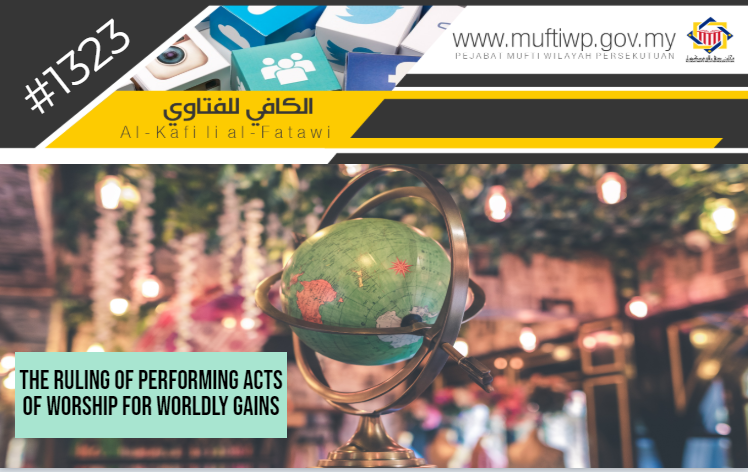
Question:
Assalamualaikum SS Dato’ Mufti. I have a question, is it permissible for us to perform acts of worship hoping to just get worldly gains. For example, we perform the sunnah Dhuha prayer and recite surah al-Waqiah to get rich?
Hope for an explanation from Mufti. Thank you.
Answer:
Waalaikumussalam wrt.wbt.
Alhamdulillah, praise and thanks to Allah for the countless blessings He has blessed us all with. Blessings and salutations to the Prophet Muhammad PBUH, his wives, his family, companions and all those that follow his teachings to the day of judgement.
Allah SWT commanded Muslims to worship Allah SWT with sincerity. Allah SWT state:
وَمَا أُمِرُوا إِلَّا لِيَعْبُدُوا اللَّـهَ مُخْلِصِينَ لَهُ الدِّينَ حُنَفَاءَ وَيُقِيمُوا الصَّلَاةَ وَيُؤْتُوا الزَّكَاة ۚ
“And they were not commanded except to worship Allah, [being] sincere to Him in religion, inclining to truth, and to establish prayer and to give zakah.”
Surah al-Bayyinah (5)
Allah SWT also state:
إِنَّا أَنزَلْنَا إِلَيْكَ الْكِتَابَ بِالْحَقِّ فَاعْبُدِ اللَّـهَ مُخْلِصًا لَّهُ الدِّينَ
“Indeed, We have sent down to you the Book, [O Muhammad], in truth. So, worship Allah, [being] sincere to Him in religion.”
Surah al-Zumar (2)
Ibnu Kathir when commenting on the above verse explains the meaning of the phrase ‘فَاعْبُدِ اللَّهَ مُخْلِصًا لَّهُ الدِّينَ’ saying, “Worship Allah SWT as the one and only god. And enjoin others regarding it. Teach them that there is none worthy of worship except Him only. Indeed, Allah SWT is the one and only god, incomparable with all.” (Refer Tafsir Ibn Kathir, 4:46)
Furthermore, the Prophet PBUH also state in a hadith:
إِنَّمَا اْلأَعْمَالُ بِالنِّيَّاتِ وَإِنَّمَا لِكُلِّ امْرِئٍ مَا نَوَى. فَمَنْ كَانَتْ هِجْرَتُهُ إِلَى اللهِ وَرَسُوْلِهِ فَهِجْرَتُهُ إِلَى اللهِ وَرَسُوْلِهِ، وَمَنْ كَانَتْ هِجْرَتُهُ لِدُنْيَا يُصِيْبُهَا أَوْ امْرَأَةٍ يَنْكِحُهَا فَهِجْرَتُهُ إِلَى مَا هَاجَرَ إِلَيْهِ
"Actions are (judged) by motives (niyyah), so each man will have what he intended. Thus, he whose migration (hijrah) was to Allah and His Messenger, his migration is to Allah and His Messenger; but he whose migration was for some worldly thing he might gain, or for a wife he might marry, his migration is to that for which he migrated."
Sahih al-Bukhari (54)
Ibn Daqiq al-Eid RA wrote from Imam Ahmad RA and Imam al-Syafie RA that the above hadith is a third of knowledge. Al-Baihaqi said it is considered as a third of knowledge for any actions of a human is through his heart, tongue or body parts and intention is a third of these matters. (Refer Syarah Ibn Daqiq al-Eid ‘ala al-Arbain al-Nawawiah: 7-8)
According to the above Quranic and prophetic evidences, it is clear that we are commanded to worship Allah SWT sincerely without any other intentions. Hence, performing acts of worship that Allah SWT has promised certain rewards for it, with the hopes of just attaining worldly gains stipulated is not considered as a good deed.
Consequently, we should contemplate and remember that the blessings of Allah SWT and His rewards in the hereafter is far greater than any worldly gains in this temporary world. Allah SWT state:
وَالْآخِرَةُ خَيْرٌ وَأَبْقَىٰ
“While the Hereafter is better and more enduring.”
Surah al-A’laa (17)
Remember that worldly riches are not something that is invaluable nor is it eternal. It will deplete when used. Everything will break and eventually wear out and can no longer be used after some time. How insignificant is the temporary worldly riches when compared to the blessings and riches of the eternal hereafter if one attains the blessings and love of Allah SWT?
Conclusion
According to the discussion above, we would like to state that performing acts of worship just to attain worldly gains is impermissible. The reason is, by doing so, we will no longer performing the worship sincerely for the sake of Allah SWT.
We pray to Allah SWT as stated in the recitation of Iftitah every time we pray, so that we will be sincere in everything that we do:
قُلْ إِنَّ صَلَاتِي وَنُسُكِي وَمَحْيَايَ وَمَمَاتِي لِلَّـهِ رَبِّ الْعَالَمِينَ
Say, "Indeed, my prayer, my rites of sacrifice, my living and my dying are for Allah, Lord of the worlds.
Surah al-An’am (162)
Wallahua’lam.

